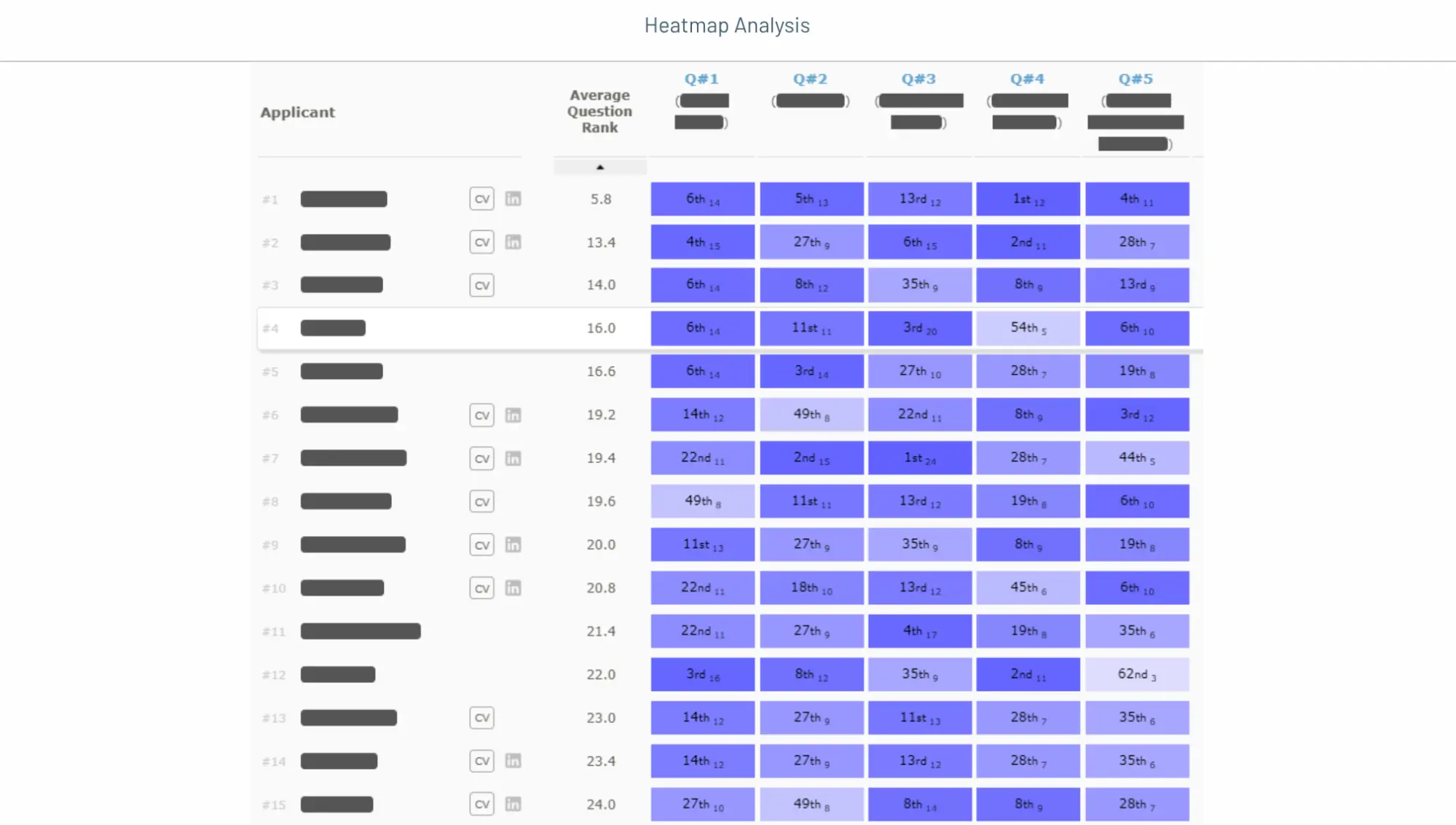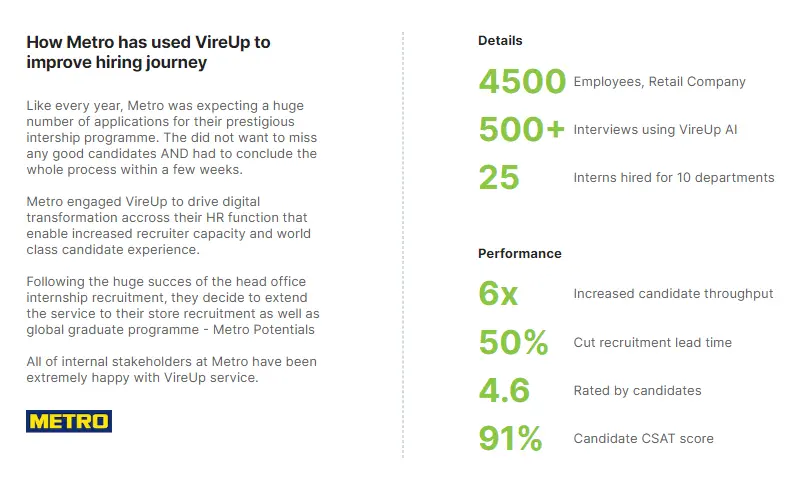What do hiring and Tinder have in common? In both, you're searching for the perfect match, but as a recruiter, instead of swiping left or right, you're sending candidates pre-employment tests.
Some companies are afraid that pre-employment tests might be too time-consuming, but they save you time in the long run, especially if you can find a way to automate them.
Digital transformation, which often involves using technology to automate processes, is the second highest priority for the staffing industry in 2023, and it might be a perfect time for you to hop on that train as well!
In this article, we’ll explain the most popular types of pre-employment assessments with tips on implementing them.
What are pre-employment tests?
Pre-employment tests include different types of assessments that evaluate job applicants’ skills, knowledge, personal traits and overall aptitude for a particular role, helping HR managers make informed hiring decisions.
If you want to speed up the hiring process and reduce manual activities, recruitment automation can help you put some parts of pre-employment screening on autopilot while reducing bias and ensuring fairness.
In the text below, you will see how some types of pre-employment testing can help the interview evaluation and learn about certain tips and tricks, different subtypes, questions you can use and how to automate the overall process.
Pre-employment tests: 9 assessment types
Job knowledge tests

Job knowledge pre employment tests
Job knowledge tests are a way to gauge a candidate’s technical knowledge level in a specialized field, such as a marketer's grasp of fundamental marketing principles. These tests are essential to identify the right candidates for roles demanding specialized knowledge.
In most cases, these tests can predict applicants’ job performance in certain dimensions and are vital when specific expertise is a prerequisite for a new role.
However, you shouldn't rely only on the job knowledge test results alone when selecting the best candidates because a job knowledge test may overlook crucial traits like a person's ability to learn and adapt or act as a team member. Job candidates might need more knowledge but be quick learners or possess vast knowledge but need help with adapting.
Cognitive ability tests
Cognitive ability tests or aptitude tests are standard tests that assess a candidate's overall mental capacity. They are used to test different aspects such as verbal reasoning, numerical reasoning, logical reasoning, learning agility etc.
They are invaluable in diverse occupational settings, particularly for mid-to-higher-level positions.
The two common subtypes of cognitive ability tests are:
- GAT (General Aptitude Test): You can use it to evaluate a candidate's general aptitude and measure a wide range of cognitive abilities such as numerical, verbal and logical reasoning.
- CCAT (Criteria Cognitive Aptitude Test): You can use it to evaluate more specific things like a candidate's critical thinking, problem-solving skills and attention to detail. Recruiters commonly use it to assess candidates' suitability for roles that require strong analytical thinking.
Both tests are widely used across different industries, but some experts warn that practice can enhance scores, thus not accurately reflecting a candidate's inherent cognitive abilities.
Personality tests
You can use personality assessments to check candidates' alignment with company culture and values and the potential translation of their traits into job performance.
For example, certain character traits like extraversion correlate to success in sales roles, highlighting the Big Five model's significance.
The most popular personality tests to predict job performance include:
- Myers-Briggs Type Indicator
- Big Five Personality Test
- Caliper Profile
- SHL Occupational Personality Questionnaire
- Hogan Personality Inventory (HPI)
- DiSC Behavioral Inventory
Bear in mind that social desirability bias significantly influences self-reported tests, leading individuals to respond in ways they believe are favorable, thus potentially misrepresenting themselves.
Moreover, some candidates might perceive personality questionnaires as intrusive, which can negatively impact their experience.
Emotional intelligence tests

Emotional intelligence pre employment tests
Emotional intelligence (EI) tests estimate candidates’ ability to comprehend and foster relationships while understanding both their own and the emotions of others.
An emotional intelligence test is crucial for roles demanding frequent interpersonal interaction and leadership, such as people working directly with customers or in human resources.
These tests analyze relationship-building and emotional handling skills that are essential for resolving conflicts and difficult situations. Skills revealed through these tests, such as teamwork, adaptability and empathy contribute to fostering a supportive work environment.
Here are the most common EI tests:
- MSCEIT (Mayer-Salovey-Caruso Emotional Intelligence Test)
- Emotional Intelligence Appraisal
- BarOn Emotional Quotient Inventory
- Genos Emotional Intelligence Inventory
Evaluating the candidate's emotional intelligence was the biggest challenge for recruiters hiring remotely, so it may be worth paying special attention if your teams are remote or hybrid.
Skill assessment tests
Skills assessment tests focus on evaluating practical abilities rather than theoretical expertise or abstract personality traits. These assessments evaluate either soft skills, such as attention to detail, or hard skills such as computer literacy.
However, these skills assessment tests can be time-intensive, requiring candidates to submit work and forcing hiring managers to allocate a lot of time for evaluation. Therefore, they're typically used in the later stages of the hiring process.
While general skills tests predict entry-level job performance, specific assessments like typing speed or software proficiency indicate current competency levels rather than predict long-term performance.
Therefore, instead of relying purely on skills assessment software, it's important to use it in combination with aptitude and personality tests to gain a comprehensive view of candidates.
Situational judgment tests
Situational judgment tests (SJTs) depict work-related scenarios for candidates, prompting them to outline how they would handle particular situations. These tests assess social competencies like conflict resolution and leadership skills.
You can administer SJTs in two ways:
- Linearly: All candidates get the same sequence of questions or situations.
- Interactively: The scenarios adapt based on previous responses.
These simulations gauge problem-solving, negotiation and cultural awareness, which can be particularly effective for managerial roles. They exist in various formats, such as scenario-based questions or options for optimal actions.
Here are a few examples:
- Scenario #1: You receive a call from an angry customer who is unhappy with the product/service they received. They demand an immediate refund, which is not per your company’s policy. What would you do?
- Scenario #2: You’re a manager, and one of your team members is constantly late, and others complain that it’s affecting their productivity. What action would you take to prevent them from being late?
- Scenario #3: A client needs a logo for their new business but refuses to provide specific design ideas or examples they like. How would you approach the project?
You can leave the questions open-ended or give candidates a couple of options to choose from. Let's explore the pros and cons of both options.
Open-ended questions allow candidates to provide detailed responses, leading to more valuable insights into their problem-solving, decision-making and unique perspectives. On the other hand, evaluating open-ended answers is more time-consuming, makes it difficult to standardize the evaluation of responses and can lead to potential bias as different assessors may interpret and score the answers differently.
Providing options helps standardize the evaluation process and allows for more quantifiable and comparable responses, making it easier to score and rank candidates. However, they provide limited insights and less accurate assessments because there is a risk that a candidate may try to guess the correct answer or the provided options don't align with their thinking.
With these in mind, you should try to adopt a hybrid approach with the combination of open-ended questions and options and train assessors on how to evaluate the answers fairly.
Physical ability tests
Physical ability tests assess strength and stamina crucial for physically demanding roles like firefighters or law enforcement, adding an essential layer to the hiring process for employers. Evaluating these competencies mitigates workplace accidents and ensures the selection of capable candidates.
However, the resemblance to medical examinations poses potential legal issues. Careful consideration of gender, age and other differences in interpreting candidates' results is vital to avoid discrimination issues.
Integrity tests
Integrity tests, also called honesty tests, are a type of risk pre-employment test. They provide objective insights into candidates' reliability in aligning responses with ethical conduct in workplace scenarios. These evaluations offer a glimpse into a potential cultural fit and collaboration with colleagues.
For example, integrity test questions cover scenarios such as consistency in values, reactions to policy violations and ethical considerations in different situations.
However, there are concerns regarding falsified responses, especially in explicit integrity tests. Candidates may hesitate to admit past transgressions, thus impacting truthfulness. Employers should also acknowledge the potential for personal growth and change when interpreting these test outcomes.
The questions on the integrity test may vary according to your industry, but here are some universal examples that can serve as inspiration:
- Hypothetical scenario: You discovered that a co-worker has been taking office supplies home without permission. How would you react?
- Ethical dilemma: You witness a co-worker falsifying their timesheet to get paid for hours they did not actually work, but you know that they have a sick child and needed to take unpaid time off. What would you do?
- Confidentiality: You accidentally overheard a private conversation between two managers discussing sensitive company information that could affect your team. What would you do?
Language proficiency tests
Assessing a candidate's language skills – comprising speaking, listening, writing and reading comprehension – ensures their suitability for the specific role's linguistic demands.
This is especially important for working in international teams or with customers from different linguistic backgrounds.
Language tests usually consist of multiple-choice evaluations involving passages that address vocabulary, grammar, spelling, reading comprehension and common phrases. Additionally, spoken ability is also tested during an interview evaluation.
The only downside is that testing spoken language can be time-consuming and may require hiring external linguistic experts. That's why VireUp has developed an automated spoken English assessment with the help of AI that happens simultaneously with the video interview.
Pre-employment tests & assessment: How can VireUp help?

Pre employment tests: VireUp
VireUp is an AI-driven pre-employment platform that functions as automated video interviewing software intended to streamline the recruitment process and help companies of all sizes secure top talent.
It simplifies the process and improves decision-making as recruiters can interview thousands of applicants simultaneously without compromising on the quality and applicant experience.
Here are the key features that make our platform stand out:
- Standardized interview questions: Our platform enables you to effortlessly create behavioral and technical questions for positions of different seniorities. You can then screen candidates against identical questions and evaluation criteria, ensuring a fair, consistent process and more objective results.
- Explainable AI: You no longer need to watch the video interviews, as our time-saving features provide a detailed analysis of the entire conversation, sentence by sentence, uncovering hidden talents and eliminating bias. All this is possible thanks to VireUp’s proprietary explainable AI based on natural language processing.
- Automated language assessments: Our platform automatically assesses spoken English language competencies while applicants answer the interview questions, thus eliminating the need for additional expensive language tests.
- Coaching-level feedback: We at VireUp know that feedback is a rare and valuable gift, and our inclusive AI interview platform can provide each applicant with detailed and actionable feedback, helping them to improve their performance. This is a major bonus point for your employer branding.
Still not convinced? Read this article to discover why automated video interviews are good both for candidates and recruiters.
Client's story
Metro, one of the biggest international food wholesale and retail chains, went through a significant increase in applications for internships and job openings.
VireUp helped them transform their hiring process by automating a large portion of it and providing hiring managers with detailed analytics and real-time reporting.
As a result, they managed to cut recruitment time by 50% and increase candidate throughput six times.
That's not all, as candidates also report world-class experience and a high level of satisfaction with the hiring process.

VireUp Metro case study
Conclusion
Finding the most qualified candidate can be overwhelming and time-consuming.
The good news is that it's possible to interview enormous numbers of candidates without an extensive human resource team. You can use various assessment tools to eliminate manual work, reduce bias and improve data accuracy.
VireUp is an AI-powered hiring platform that enables you to speed up recruitment cycles by 40% while also reducing recruitment costs by 45%.
If you want to see our platform in practice, book a free call to see how we can make your recruitment process even more efficient.
FAQs
What are the most commonly used pre-employment tests?
The most common pre-employment tests include cognitive ability tests, personality assessments, tests for specific skills and job-related knowledge. Of course, everything depends on the specific role and industry you're hiring for.
What is a practical test for a job interview?
It's an assessment that evaluates a candidate's capabilities and skills related to specific job tasks, allowing employers to observe how candidates perform actual job-related assignments. For example, candidates applying for graphic design positions might be asked to do a sample design to demonstrate their skills and expertise.
What is a good score on CCAT?
A good score on the Criteria Cognitive Aptitude Test (CCAT) depends on the specific job requirements and competition for that role. Generally, having a score higher than the average score of other job applicants is important. Knowing that the average score on CCAT is 24/50, anything above 25 puts you into the more successful half of the candidates.
What are the psychometric tests before an interview?
Psychometric tests measure a candidate's cognitive abilities, personality traits and other psychological attributes. The most common types of these tests are personality and emotional intelligence assessments, cognitive ability tests, situational judgment tests and multiple verbal, numerical and abstract reasoning tests.

